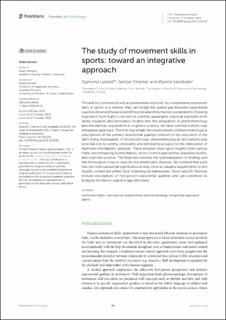| dc.contributor.author | Loland, Sigmund | |
| dc.contributor.author | Ettema, Gertjan | |
| dc.contributor.author | Sandbakk, Øyvind Bucher | |
| dc.date.accessioned | 2024-02-28T15:39:48Z | |
| dc.date.available | 2024-02-28T15:39:48Z | |
| dc.date.created | 2023-11-28T12:54:42Z | |
| dc.date.issued | 2023 | |
| dc.identifier.citation | Frontiers in Psychology. 2023, 14, 1252201. | en_US |
| dc.identifier.issn | 1664-1078 | |
| dc.identifier.uri | https://hdl.handle.net/11250/3120362 | |
| dc.description.abstract | The article commences with a fundamental objective: to comprehend movement skills in sports in a manner that can bridge the dualist gap between experiential qualities observed in practice and theoretical and mechanistic explanations. Drawing inspiration from Kuhn’s concept of scientific paradigms, practical examples from skiing research, and innovative insights into the integration of phenomenology and mechanistic explanation in cognitive science, we have outlined a three-step integrative approach. The first step entails the development of phenomenological descriptions of the primary experiential qualities inherent in the execution of the skills being investigated. In the second step, phenomenological descriptions play a pivotal role by setting constraints and delineating a space for the elaboration of multilevel mechanistic analyses. These analyses draw upon insights from various fields, encompassing biomechanics, motor control approaches, expertise studies, and cognitive science. The third step involves the systematization of findings and the formulation of sport-specific movement skills theories. We contend that such theories hold substantial significance as they serve as valuable supplements to skill studies conducted within rigid, nomological frameworks. Sport-specific theories include descriptions of first-person experiential qualities and can contribute to bridging the theory-practice gap effectively. | en_US |
| dc.language.iso | eng | en_US |
| dc.publisher | Frontiers | en_US |
| dc.rights | Navngivelse 4.0 Internasjonal | * |
| dc.rights.uri | http://creativecommons.org/licenses/by/4.0/deed.no | * |
| dc.title | The study of movement skills in sports: toward an integrative approach | en_US |
| dc.title.alternative | The study of movement skills in sports: toward an integrative approach | en_US |
| dc.type | Peer reviewed | en_US |
| dc.type | Journal article | en_US |
| dc.description.version | publishedVersion | en_US |
| dc.source.pagenumber | 8 | en_US |
| dc.source.volume | 14 | en_US |
| dc.source.journal | Frontiers in Psychology | en_US |
| dc.identifier.doi | 10.3389/fpsyg.2023.1252201 | |
| dc.identifier.cristin | 2203796 | |
| cristin.ispublished | true | |
| cristin.fulltext | original | |
| cristin.qualitycode | 1 | |

